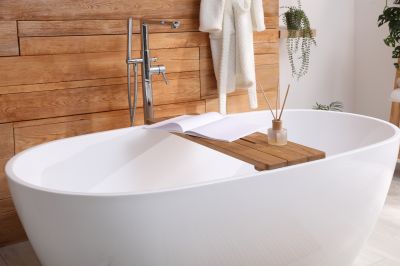Favorite Bathtub Installation Products For DIY Enthusiasts
Get the right products to complete your bathtub installation with confidence, whether you're a beginner or experienced handyman.
 Installing a bathtub involves selecting the right products to ensure safety, durability, and proper functionality. The process begins with understanding the various components needed for a successful installation, including the bathtub itself, plumbing fixtures, waterproofing materials, and support structures. Choosing quality products can help prevent issues such as leaks, mold growth, and structural damage over time. It is important to consider the space available, the style of the bathroom, and the specific needs of the household when selecting these components.
Installing a bathtub involves selecting the right products to ensure safety, durability, and proper functionality. The process begins with understanding the various components needed for a successful installation, including the bathtub itself, plumbing fixtures, waterproofing materials, and support structures. Choosing quality products can help prevent issues such as leaks, mold growth, and structural damage over time. It is important to consider the space available, the style of the bathroom, and the specific needs of the household when selecting these components.
Top Overall Option
Universal Bathtub Installation Kit
A comprehensive installation kit that includes essential components such as waterproofing membranes, adjustable support brackets, and plumbing fittings. Designed for versatility, it can accommodate various bathtub sizes and configurations, simplifying the installation process for both DIYers and professionals. Its all-in-one approach helps ensure compatibility and reduces the need for multiple purchases, making it a practical choice for many bathroom renovation projects.
Types of Products For Bathtub Installations
Bathtub Shells
The core structure of the bathtub, available in various materials such as acrylic, fiberglass, or cast iron, each offering different durability and aesthetic options.
Faucets and Showerheads
Fixtures that control water flow and temperature, available in numerous styles and finishes to match bathroom decor.
Drain Assemblies
Components that ensure proper water drainage, including pop-up drains, overflow fittings, and trap assemblies.
Waterproofing Membranes
Materials used to prevent water seepage behind the bathtub, protecting walls and floors from moisture damage.
Support Brackets and Frames
Structural elements that provide stability and support for the bathtub during and after installation.
Bathtub Surrounds
Enclosures or panels that surround the bathtub, offering aesthetic appeal and additional waterproofing.
Shower Enclosures
Glass or acrylic enclosures that contain water within the bathing area, reducing splashes and enhancing safety.
Grab Bars and Safety Accessories
Supportive fixtures that improve safety, especially for elderly or mobility-impaired users.
Installation Kits
All-in-one packages that include necessary fittings, mounting hardware, and instructions for a streamlined setup.
Tile and Wall Panels
Materials used to finish the surrounding walls, providing a waterproof and decorative surface.
Shims and Leveling Devices
Tools that help ensure the bathtub is perfectly level during installation.
Sealants and Caulks
Materials used to seal joints and edges, preventing water infiltration and mold growth.
Access Panels
Panels that provide access to plumbing connections for maintenance and repairs.
Popular Choices
Lightweight and versatile, these tubs are popular for their ease of installation and variety of designs.
Stylish and adaptable, suitable for various bathroom layouts and often used as focal points.
Designed to maximize space, fitting into corner areas for efficient bathroom layouts.
Accessible options that feature doors for easy entry, often preferred for safety and convenience.
Installed into a pre-built deck or surround, offering a seamless look and customizable design.
Vintage-style tubs that add character and charm, often used in traditional or eclectic bathroom designs.
Designed to fit into three-wall alcoves, commonly used in standard bathroom layouts.
Features for hydrotherapy and relaxation, with built-in jets and massage functions.
Deep tubs intended for full-body immersion, popular for relaxation purposes.
Freestanding tubs that sit on the bathroom floor, often with modern or artistic designs.
Designed with water-saving features and sustainable materials for conscious consumers.
Combination units that include features like integrated seats or storage options.
Heavy and durable, these tubs evoke a classic aesthetic and are valued for their longevity.
Tubs installed within a custom surround for a finished look and added waterproofing.
Smaller models suitable for limited spaces, maximizing functionality in compact bathrooms.
High-end options featuring advanced hydrotherapy, lighting, and comfort features.
Bathtub installation may require additional accessories such as grab bars, shower curtains, or glass enclosures, depending on user preferences and safety requirements. Proper preparation of the installation area, including waterproofing and secure framing, is essential to achieve a long-lasting setup. Many products are designed to facilitate easier installation, whether for DIY enthusiasts or professional contractors, with features like adjustable fittings, pre-assembled units, and comprehensive installation kits.
In addition to the bathtub itself, the plumbing connections are critical. Quality faucets, drain assemblies, and water supply lines ensure efficient operation and minimize the risk of leaks. For those upgrading or replacing an existing bathtub, compatibility with existing plumbing can be a key consideration. Overall, selecting the right combination of products tailored to your specific bathroom layout and usage expectations can contribute to a safe, functional, and aesthetically pleasing bathing space.
Key Buying Considerations
- Size and dimensions of the bathtub to fit your bathroom space.
- Material choices such as acrylic, fiberglass, cast iron, or composite for durability and appearance.
- Type of installation (drop-in, alcove, freestanding, corner) compatible with your bathroom layout.
- Plumbing compatibility and ease of connecting existing water lines.
- Weight of the bathtub and support requirements, especially for heavier materials like cast iron.
- Water capacity and depth for comfort and intended use.
- Additional features such as jets, built-in shelving, or ergonomic design.
- Safety features including slip-resistant surfaces and grab bars.
- Ease of maintenance and cleaning requirements for different materials.
- Aesthetic style and finish to match your bathroom decor.
- Budget considerations and availability of installation kits or accessories.
- Availability of warranty or customer support services.
- Compatibility with existing plumbing fixtures and drain locations.
- Installation complexity and whether professional help is recommended.
- Local building codes and regulations relevant to bathtub installation.
